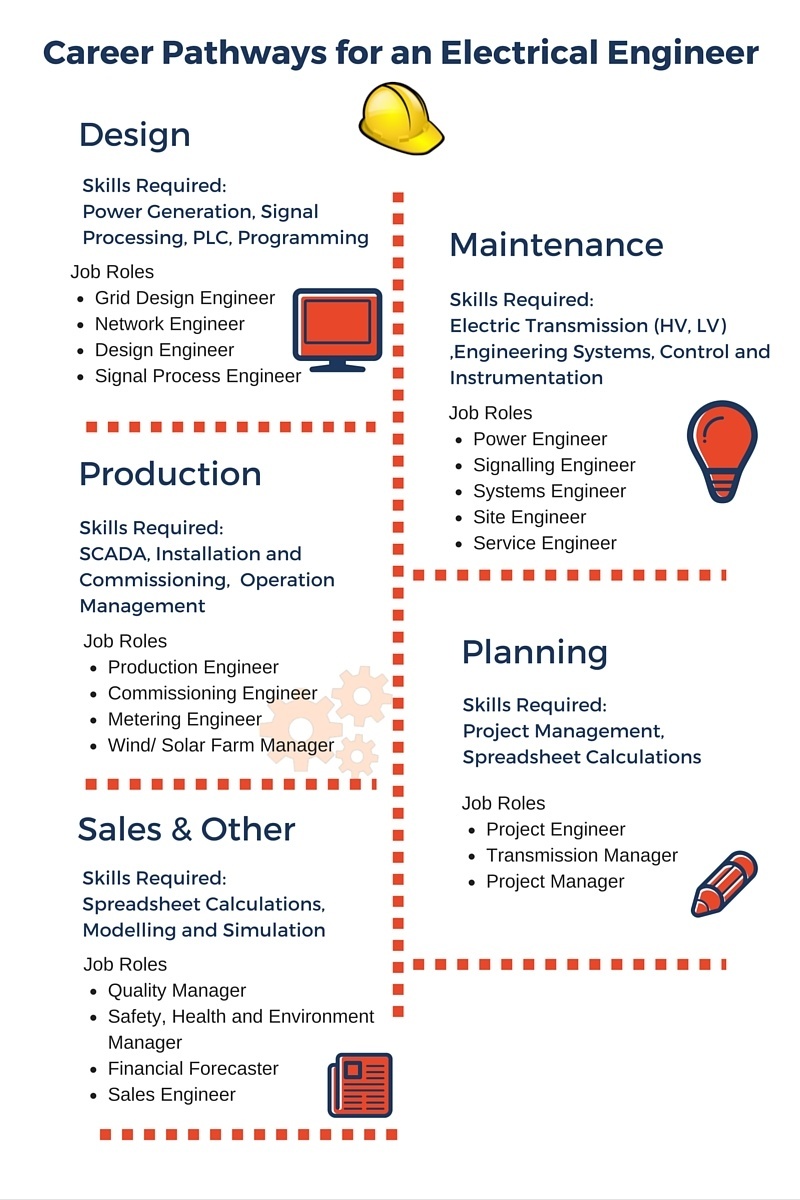Design
Skills Required:
Power Generation, Signal Processing, PLC, Programming
Job Roles
- Grid Design Engineer
- Network Engineer
- Design Engineer
- Signal Process Engineer
Maintenance
Skills Required:
Machine Design, Engineering Systems, Control and Instrumentation
Job Roles
- Power Engineer
- Maintenance Engineer
- Systems Engineer
- Site / Field Engineer
Production
Skills Required:
SCADA, Installation and Commissioning, Operation Management
Job Roles
- Production Engineer
- Commissioning Engineer
- Metering Engineer
- Wind/ Solar Farm Manager
Planning
Skills Required:
Project Management, Spreadsheet Calculations
Job Roles
- Project Engineer
- Transmission Manager
- Project Manager
Sales & Other
Skills Required:
Spreadsheet Calculations, Modelling and Simulation
Job Roles
- Quality Manager
- Safety, Health and Environment Manager
- Financial Forecaster
- Sales Engineer
Electrical Engineering
Engineers by their training are analytical professionals. On job, they require a variety of core skills from complex problem solving, trouble shooting to due diligence and communication.

At times their job requires taking initiative, creativity an innovation. Electrical engineering is a relatively younger discipline in Engineering, when compared to Mechanical and Civil Engineering. Two of the greatest Electrical Engineers from the 20th century were Nikolai Tesla and Thomas Edison. Being contemporaries, their rivalry sparked great progress in the field in a small amount of time. Lighting that was chemical (oil based) was replaced by electrical lights and drive trains that were mechanical (steam engines) got replaced with electric motors. Electrification of railway network and requirement of electric transmission through a power grid provided vast opportunities for the discipline of Electrical Engineering to develop and flourish.
More recently, Electric cars are making huge inroads in the automotive Industry. Smart grids similarly are needed as Electrical generation becomes more indigenous through renewable energy technology. The overhaul of the grid network in many countries is pointing towards a shortage of skilled personal in the industry. The demand for electrical engineers has historically seen a steady increase but is set to rise further the near future. Because the core skill of Electrical Engineer is Analysis and diagnostics, there are a variety of non Engineering jobs available to the graduates of this discipline as depicted in the infographic
Disclaimer: This infographic is for student’s guidance only. It can be used for highlighting the variety of roles, for which an electrical engineer can apply. The data has been collated to the best of author’s research ability/ knowledge and may not be accurate. Note that the titles of the job roles are fluid and can shift with change in technology.
